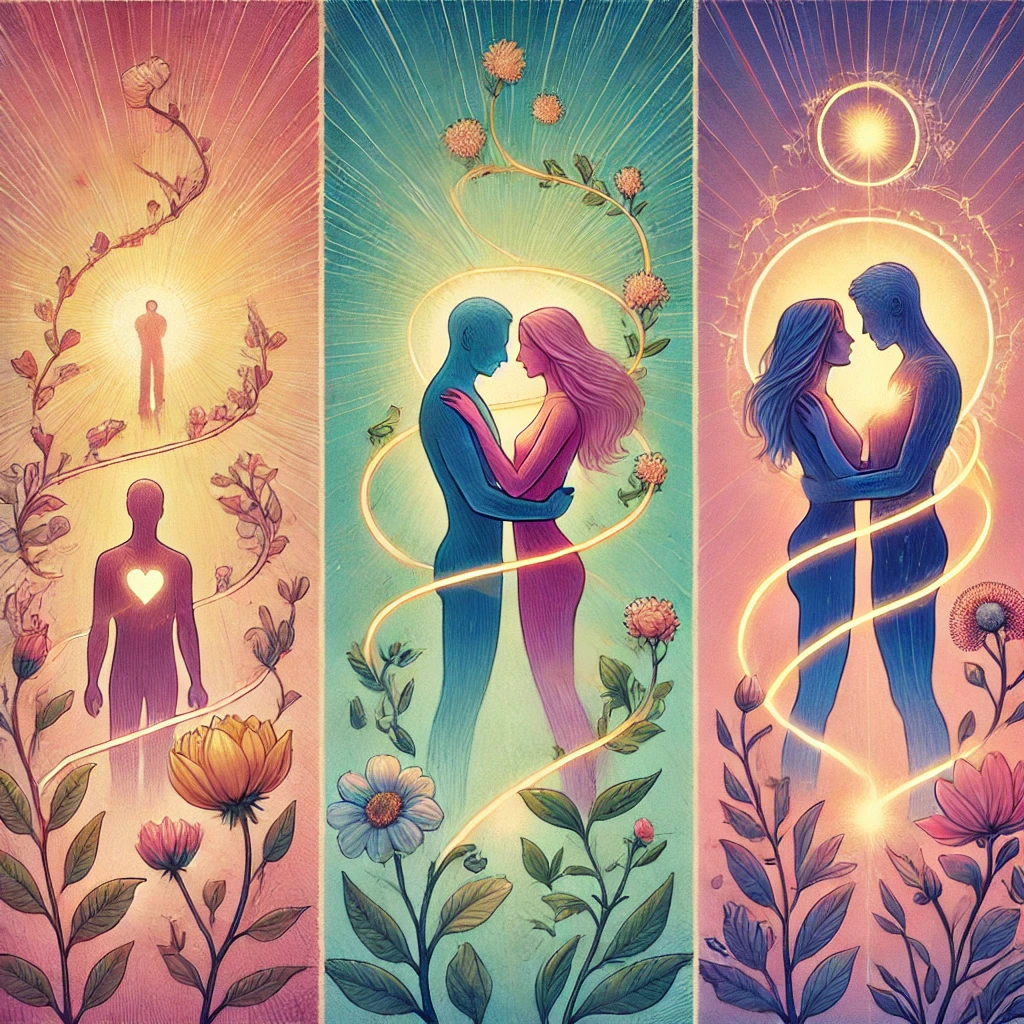Love, in all its forms, is one of the most profound and complex human experiences. Over time, the concept of love has evolved, influenced by cultural shifts, personal development, and changing social norms. Today, the way we approach relationships, romantic connections, and even our own identities is vastly different from the ideals of past generations. The evolving landscape of love is increasingly shaped by self-love, individual growth, and a broader, more inclusive understanding of what it means to connect with others.
Self-Love and Individual Growth: A Shift in Priorities
For centuries, the dominant narrative around love focused on romantic relationships as the pinnacle of emotional fulfillment. In the past, love often meant finding a partner who would complement and complete you. Society placed immense pressure on individuals to find “the one,” and marriage was seen as a necessary institution for securing personal happiness and social status. However, in recent years, there has been a seismic shift in how we view love—both romantic and personal.
Today, the idea of “completing” another person is no longer seen as the goal of a relationship. Instead, the focus has turned inward, with a growing emphasis on self-love, personal growth, and mental well-being. The popularization of self-care and mindfulness practices has allowed individuals to prioritize their own emotional and psychological health. As a result, people now view relationships as an addition to their lives rather than the solution to their problems or the missing piece of their puzzle.
This shift in perspective has led to a change in how romantic relationships are viewed and pursued. Instead of seeking someone to “save” them or fulfill unmet needs, individuals now recognize that healthy relationships are built upon the foundation of self-love. People understand that personal growth—whether through therapy, self-reflection, or life experiences—is crucial to fostering meaningful connections with others.
Furthermore, with an increasing understanding of mental health, individuals are more aware of the importance of emotional intelligence and communication skills in relationships. This has led to more authentic connections, where partners support each other in their respective growth journeys. In this context, love becomes less about dependency and more about mutual support and shared growth.
The Rise of Personal Development and Boundaries
Personal development, once considered a niche pursuit, has become a mainstream endeavor. More people are dedicating themselves to learning about themselves, developing new skills, and challenging old patterns. As part of this shift, individuals are embracing the importance of setting healthy boundaries within relationships.
Boundaries, both personal and relational, are now seen as essential to maintaining emotional health and respect within romantic partnerships. In the past, many people were taught to sacrifice their needs for the sake of love, often leading to unhealthy relationships. Now, the focus has shifted to the importance of maintaining one’s individuality and respecting each other’s autonomy within relationships. Couples are encouraged to grow together while still nurturing their separate identities and aspirations.
This focus on personal development also extends to how people navigate relationship dynamics. Emotional literacy is gaining traction as a vital component of healthy relationships. Individuals are more inclined to express their emotions clearly, engage in open dialogue, and practice empathy. This has shifted the way love is experienced—from a one-dimensional feeling to a complex, multi-faceted connection that evolves over time.
The Redefinition of “Soulmates” and the Rise of Choice-Based Love
One of the most significant shifts in the evolving landscape of love is the changing notion of “soulmates.” For centuries, the idea of a soulmate—the belief that each person has one predestined partner, meant to be together for all eternity—was deeply ingrained in romantic ideals. Love was thought to be a cosmic force, drawing people together for a higher purpose. This belief, often romanticized by literature, film, and religion, implied that finding your soulmate was the ultimate goal of life.
However, today, many people are questioning this traditional notion. The rise of individualism, coupled with a greater focus on personal growth and independence, has led to a rethinking of what it means to find “the one.” Increasingly, people are seeing love as a choice, not a preordained event. Relationships, instead of being viewed as destined encounters, are now seen as a series of intentional decisions made over time. This reflects a broader shift toward a more active and conscious approach to love—one that requires effort, communication, and mutual commitment.
For some, the idea of soulmates has evolved to encompass multiple partners or connections throughout life. Rather than finding a single, eternal love, people now recognize that they may experience different types of love with different people at various stages of their lives. These connections are often seen as deeply meaningful, even if they don’t last forever. The emphasis is on the quality of the connection and the personal growth that comes from it, rather than an expectation of permanence.
Polyamory and Non-Monogamy: Expanding the Definition of Love
Alongside this redefinition of soulmates is the rise of non-traditional relationship structures, including polyamory and open relationships. In the past, monogamy was viewed as the default setting for romantic love. Society reinforced the idea that love could only be fully realized within the confines of a monogamous partnership. This often meant that individuals in monogamous relationships were expected to meet all of each other’s emotional, social, and sexual needs—an expectation that proved challenging for many.
In recent years, however, more people have embraced the idea that love is not limited to one person. Polyamory—the practice of having multiple consensual, romantic, and/or sexual relationships—is gaining visibility, particularly among younger generations. Polyamorous individuals believe that love is abundant, not scarce, and that it is possible to deeply connect with more than one person at a time. This approach challenges traditional notions of possessiveness and jealousy, instead emphasizing trust, communication, and the ability to navigate complex emotions in a healthy way.
Similarly, open relationships, where partners agree to have sexual relationships outside their primary partnership, have gained popularity. In open relationships, love is not necessarily confined to sexual exclusivity, and partners are allowed to explore connections with others while still maintaining a deep emotional bond with their primary partner.
This shift toward non-monogamy reflects a broader change in how people understand love. It is no longer seen as something that must be contained within rigid societal structures. Instead, love is understood as a dynamic, evolving force that can take many forms. This broader, more inclusive understanding of love also extends to issues of gender and sexual orientation, with many people advocating for greater acceptance of diverse relationship structures.
The Role of Technology in Shaping Modern Love
In addition to cultural shifts and evolving social norms, technology has also played a significant role in reshaping how we experience love. The advent of online dating, social media, and relationship apps has revolutionized the way people meet and connect with potential partners. In some ways, technology has expanded the possibilities for love by offering individuals access to a broader pool of potential partners than ever before.
However, technology has also introduced new challenges. While online dating platforms offer convenience, they have also been criticized for promoting superficial connections, with many people swiping through profiles without developing meaningful conversations. The pressure to present an idealized version of oneself on social media can also distort our perceptions of love and relationships. People may feel compelled to portray their relationships as perfect, which can lead to unrealistic expectations and dissatisfaction.
Despite these challenges, technology has enabled people to connect in new and innovative ways. Virtual relationships, long-distance love, and cross-cultural connections are more accessible than ever. The global nature of the internet has facilitated the creation of love across borders, allowing individuals from different backgrounds and countries to form deep and lasting relationships.
Conclusion: Love in an Evolving World
The concept of love has always been fluid, shaped by the social, cultural, and individual forces that define each era. In recent years, however, the evolution of love has been particularly pronounced, with a growing emphasis on self-love, personal growth, and a redefinition of traditional relationship structures. Today, love is seen as an active choice, a series of connections, and an ongoing journey of growth and discovery.
The idea of soulmates has expanded beyond the traditional, monogamous framework to include a more inclusive and diverse range of experiences. Polyamory, open relationships, and non-monogamous connections are challenging outdated notions of exclusivity and possessiveness. At the same time, technology is reshaping the way we meet and relate to others, providing both new opportunities and challenges for those seeking love in the modern world.
Ultimately, the evolving concept of love reflects a broader shift toward greater individualism, personal empowerment, and inclusivity. As we continue to navigate our relationships and connections, we must remain open to the many forms love can take and embrace the idea that love, in all its forms, is a dynamic, ever-changing force that enriches our lives in countless ways.
Thank you so much for taking the time to read, I hope you found something here that resonated with you or brought a smile to your face. I’d love to hear your thoughts or any tips you might have in the comments below. Until next time, take care and stay inspired!


2 comments
I am extremely impressed with your writing skills as smartly as with the layout to your weblog.
Is that this a paid subject matter or did you modify it yourself?
Anyway keep up the excellent high quality writing,
it is rare to see a great weblog like this one nowadays.
Snipfeed!
Nice